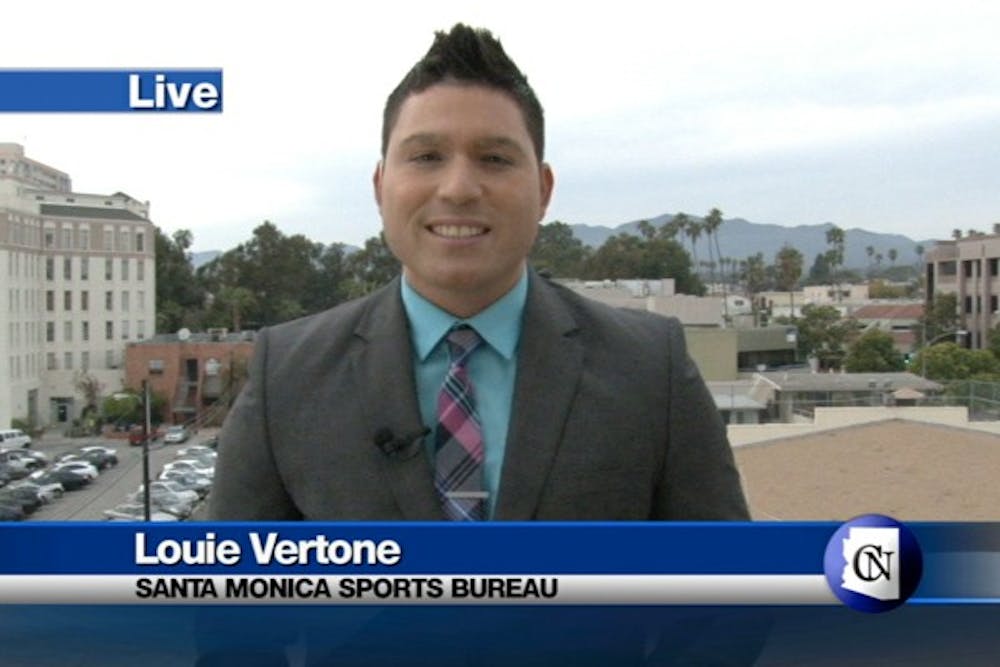 (Photo courtesy of Mark Lodato)
(Photo courtesy of Mark Lodato)After a unanimous faculty vote on Friday, students who wish to pursue a bachelor's or master's degree in sports journalism and communication may be able to do so at ASU's Walter Cronkite School of Journalism and Mass Communication in coming years.
Dean Christopher Callahan said the school is excited to begin the process of creating these programs, which are needed because of both a growing student and market demand for a sports journalism major.
“On the professional side, you see the landscape changing pretty dramatically in the sports world,” Callahan said. “If you look at local TV, there are actually fewer jobs in sports journalism. But at the same time, there has been this huge explosion of these new jobs.”
He said a huge volume of jobs have been created in a recent surge of new sports websites, sport-specific cable stations and league- and conference-centered networks like the Pac-12 Network.
“If you walked down the block to the Arizona Diamondbacks or the Suns, or went to Glendale for the Cardinals, they had PR people but didn't have content creators,” Callahan said. “But now you have teams that are creating their own content, so there are all these new jobs that didn't exist before.”
Besides being a perfect time to create the programs, ASU, especially the Downtown campus, is an ideal location for an ambitious sports journalism program, he said.
“It’s great to have a sports journalism degree in a sports mecca,” Callahan said. “Not most cities have all four sports in one area. … It just seemed like the right place, the right time and the right marketplace.”
Although this measure is an untraditional step for the journalism school, because of its previous philosophy of having many concentrations under one degree, Callahan said there are no other specialized degree programs being considered.
Mark Lodato, assistant dean and news director at the school, said he’s excited for the unique opportunities the new degrees will offer the growing number of sports journalism students.
“I love it when I can see our own students getting opportunities through Cronkite that they can’t get through anywhere else,” he said. “Anything we can do to give our students an advantage, we’re going to do it if we can.”
Lodato said the journalism school needs to separate the sports specialization because the sports field has unique differences from the rest of journalism, and ASU’s journalism programs need to reflect this.
“There are nuances to sports,” he said. “It is a different field of play. I think we need to recognize that and be responsive to that. Our goal is always to offer our students an unparalleled experience and in this case, I think there is no doubt we’ll meet that objective.”
The programs must still be approved by the University’s Academic Senate Curriculum and Academic Programs Committee, provosts and eventually the Arizona Board of Regents. The proposal won’t go to ABOR’s desk until November, so the new degrees won’t be available for students until fall 2015 at the earliest.
The curriculum requirements for the sports journalism and communication degrees will be similar to those of the general journalism degrees, with the same class requirements but a new sports angle. For example, sports journalism majors will still have to complete the usual intermediate reporting classes, but the required written stories for the class will all have a sports theme.
Journalism freshman Kristina Vicario said she would be very interested in a specialized sports journalism degree so she could be better prepared for future careers in the sports industry.
“Already the journalism classes I’m taking are very informative, and with a sports journalism specialization, that would be even better, because you'd be practicing the skills you'd be using every day,” she said.
Vicario also said the specialization would be especially beneficial for those students who don’t have the time to make their education more focused through extracurricular commitments.
“All of the clubs have improved where I am,” she said. “I think people who don’t have time to go into clubs because of work schedules and things like that are really missing out on throwing themselves into the practice early. So having a sports specialization would help kids who don't have time for these clubs.”
Overall, the new major is a good idea and would benefit ASU sports journalism students in many ways, Vicario said.
“It would help you pick up all the little things you’ll need when you go out into the field to cover sports after you graduate,” she said.
Reach the reporter at elmahone@asu.edu or follow her on Twitter @mahoneysthename
Correction: An earlier version of this article contained a caption that misspelled Mark Lodato's name.




